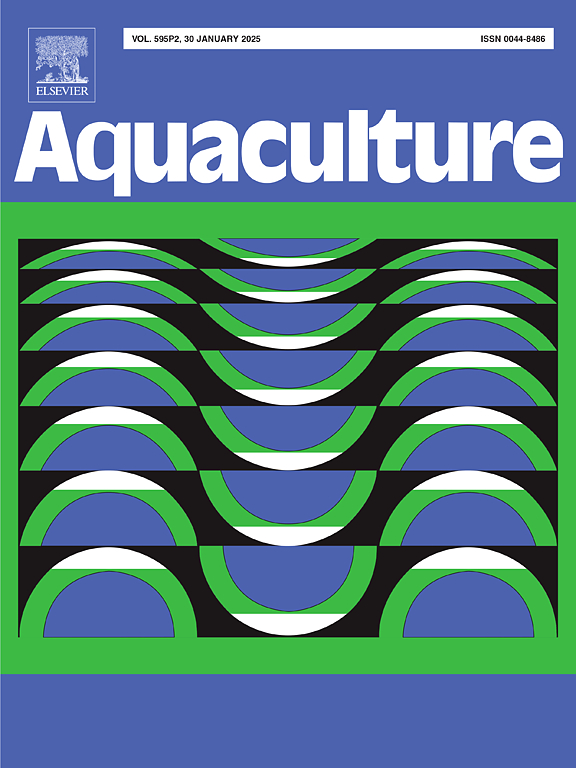amp活化蛋白激酶(AMPK)在低盐度胁迫下调节马尼拉蛤脂质代谢中的潜在作用
IF 3.9
1区 农林科学
Q1 FISHERIES
引用次数: 0
摘要
脂质代谢被认为在帮助水生动物适应环境变化中起着至关重要的作用。在马尼拉蛤(Ruditapes philippinarum)中,AMPK参与低盐胁迫下脂质代谢的调节尚不清楚。因此,本研究以菲律宾野檀(R. philippinarum)两个种群(TS野生种群和FZ培养种群)为研究对象,对低盐度胁迫的影响进行了实验研究。低盐度条件下,蛤肝胰脏甘油三酯、总胆固醇和游离脂肪酸酶活性显著降低。相反,AMPK基因表达显著增加。低盐胁迫下,SREBP-1c、ACC和SCD基因表达水平降低,CPT1和ACOX1表达水平升高。结果表明,AMPK基因可能在低盐度条件下被激活。这种激活可以抑制脂质代谢,促进脂质氧化,为渗透压调节提供能量,维持能量平衡。我们的研究提供了重要的见解,通过AMPK调节脂质代谢,能量代谢和渗透调节的分子机制,在低盐度胁迫下菲律宾龙骨。同时,也为菲律宾沙蚕的育种和养殖提供了有价值的参考。本文章由计算机程序翻译,如有差异,请以英文原文为准。
The potential role of AMP-activated protein kinase (AMPK) in regulating lipid metabolism in the Manila clam Ruditapes philippinarum under hyposalinity stress
Lipid metabolism is considered to play a crucial role in assisting aquatic animals to adapt to environmental change. In the Manila clam, Ruditapes philippinarum, the involvement of AMPK in the regulation of lipid metabolism under hyposalinity stress is not well understood. Hence, in this study, two populations (TS wild population and FZ culture population) of R. philippinarum were employed in experimentation on the effects of hyposalinity stress. The enzyme activities of triglyceride, total cholesterol, and free fatty acid in the clam hepatopancreas significantly decreased under hyposalinity. Conversely, a significant increase in AMPK gene expression was observed. Under hyposalinity stress, the levels of SREBP-1c, ACC, and SCD gene expression were decreased, whereas the levels of CPT1 and ACOX1 expression were increased. The results indicate that the AMPK gene may be activated under hyposalinity. This activation could subsequently inhibit lipid metabolism, promote lipid oxidation, provide energy for osmotic pressure regulation, and maintain energy balance. Our study delivers important insights into the molecular mechanisms by which AMPK regulates lipid metabolism, energy metabolism, and osmotic regulation in R. philippinarum under hyposalinity stress. Additionally, it offers a valuable reference for the breeding and farming of R. philippinarum.
求助全文
通过发布文献求助,成功后即可免费获取论文全文。
去求助
来源期刊

Aquaculture
农林科学-海洋与淡水生物学
CiteScore
8.60
自引率
17.80%
发文量
1246
审稿时长
56 days
期刊介绍:
Aquaculture is an international journal for the exploration, improvement and management of all freshwater and marine food resources. It publishes novel and innovative research of world-wide interest on farming of aquatic organisms, which includes finfish, mollusks, crustaceans and aquatic plants for human consumption. Research on ornamentals is not a focus of the Journal. Aquaculture only publishes papers with a clear relevance to improving aquaculture practices or a potential application.
 求助内容:
求助内容: 应助结果提醒方式:
应助结果提醒方式:


